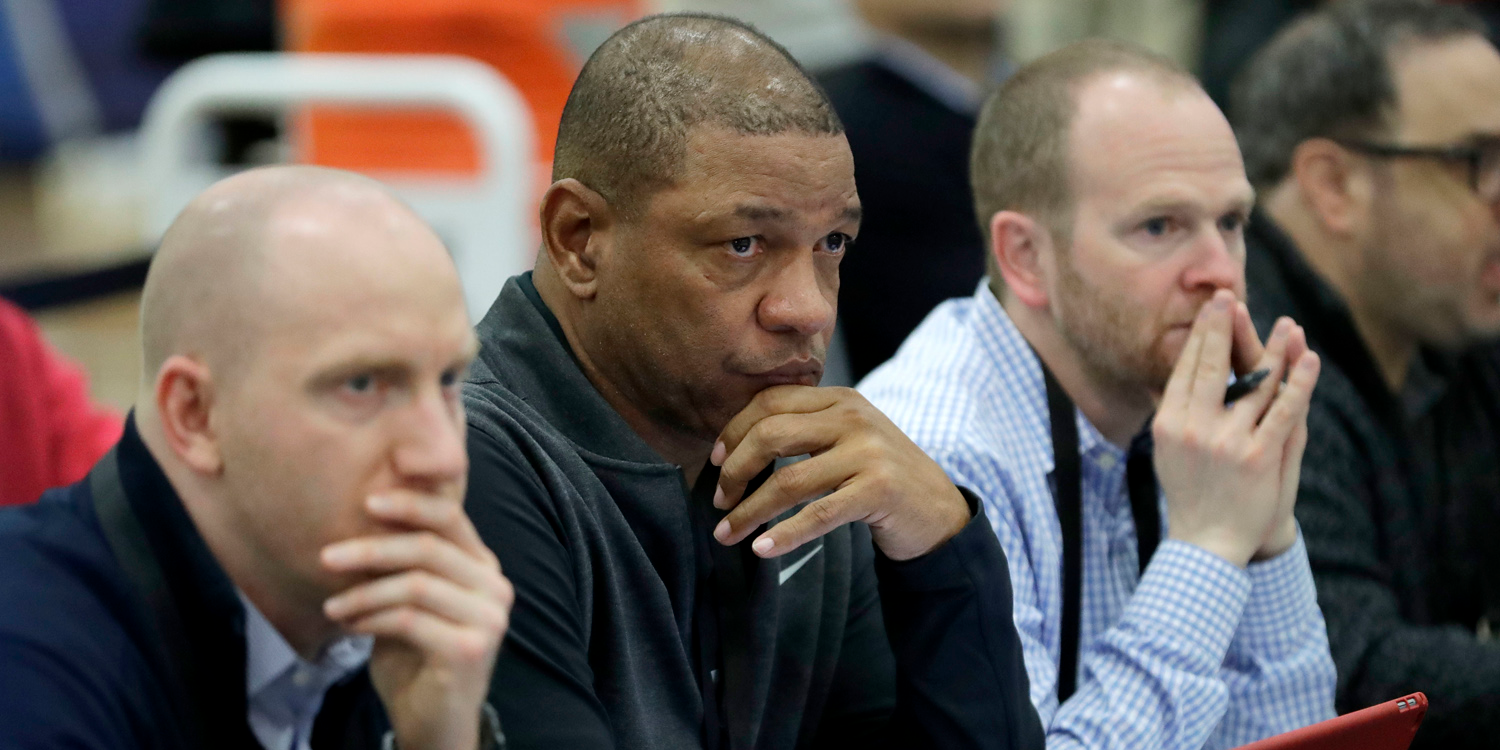- Los Angeles Clippers GM Michael Winger says there are three key components to NBA free agency: preparation, communication, and relationships.
- The three components are all intertwined – communication and relationships allow teams to prepare for months for free agency to have a roadmap and a list of options and paths for the franchise.
- Winger said that because of the amount of preparation teams do, free agency isn’t as hectic as many people would believe.
When the clock approaches 12:01 a.m. on July 1 each year, and free agency begins, NBA fans anxiously await the floodgates to open. It feels like the kickoff of an event, the start gun to a race going off.
But for NBA teams, behind the scenes, it’s not quite a sprint but a steady rollout of a process for which they have planned for months.
“For a lot of teams it’s not terribly thrilling,” Los Angeles Clippers GM Michael Winger told Business Insider.
“For process-driven front offices, all of the preparation at that point has mostly been done and, frankly, had been done for months.”
Winger said once the free agency "bell" rings, teams have a call list ready to go and they begin going through their options. It's not as simple as rolling the ball out, and every team scrambles for players.
Winger, who was hired as the Clippers GM last summer after working as the assistant GM of the Oklahoma City Thunder for seven years, explained that the process boils down to three critical factors, preparation, communication, and relationships, and may have one big misconception.
Preparation
"Very, very, very little of what we do is last-minute," Winger said. "If anything that we do is last-minute, it's because there were circumstances that popped up for which even the most thoughtful people probably could not have prepared."
Part of the job of an NBA front office is to prepare for all situations. They're aware of which players will be free agents, which players can become free agents (depending on things like contract options), what prospective free agents are looking for, and which teams are trying to make moves. They have Plans A, B, and C, and an idea of which directions to go, depending on how things shake out.
Winger explained that in the build-up to free agency, teams are scouting what the rest of the league is doing and keeping tabs on possible moves.
On June 27, for instance, the Clippers traded guard Austin Rivers to the Washington Wizards for center Marcin Gortat. The move occurred when rumors were circulating that then-Clippers center DeAndre Jordan might seek a trade to the Dallas Mavericks. The Clippers would need another center.

Meanwhile, days earlier, the Clippers used the 12th and 13th picks in the draft to take two combo guards, players who would occupy the same general role as Rivers.
Though Jordan instead opted out of his contract to become a free agent and signed with the Mavericks outright, it's not hard to see that the Clippers had a roadmap to balancing out their roster.
The preparation carries over when free agency begins. Teams have their call list ready, people who will make those calls, and designated negotiators - usually two people - who will talk to teams, agents, and players. They have an idea of the expected market for those players and how a contract might look. According to Winger, organizatipons often categorize their options and potential paths by which ones help them achieve their goal. Each team's situation is unique, and their flexibility and options may make the summer busier or quieter.
Communication
Both internal and external communication is key in free agency, according to Winger. In fact, much of the process is reaching out to different parties.
Internally, the team is evaluating their options. According to Winger, if they receive a curveball in free agency, whether it's a player demanding an unexpected contract or a trade or signing they hadn't expected, it's all-hands-on-deck.
"There are some times when things do pop up out of nowhere, and you don't have time to plan, you don't have time to prepare," Winger said. "And you do have to go back to the group immediately with, 'Holy moly, guys, we have new information here. It's material information. It's impactful information. Let's sort through this, let's dissect it, let's run it through the filters, and figure out what our output is.'"
Likewise, the team is in constant communication with people around the league.
"Our communication channels are ordinarily wide open," Winger said. "That supports our inclusion. Conversations with players and agents and teams allows us to either provide information or gather information. Often times we're helping agents do deals elsewhere. And that comes back [in] gratitude and appreciation and respect, providing us with help when we need it."
Relationships

Similarly, Winger estimated that there might not be anything as important as relationships around the league.
"Relationships might very well be the No. 1 element in doing a deal," he said.
"Some players enter free agency knowing precisely what they want, where they want to be, and how they'll approach that opportunity," Winger said. "There are times when players and teams make commitments to each other early in the process. Almost invariably those are based on relationships. And honestly, there are the mutual-interest scenarios where maybe there isn't a relationship, and it takes a few days to build that relationship.
"I'd say most connections are based on a pre-existing relationship somewhere in the family tree, whether that's in the front office, the coaching staff, ownership, somebody has a relationship with either the player or the agent."
Maintaining those relationships and lines of communication are key to the preparation teams do. Winger said the Clippers are continually reaching out to teams and agents looking for mutually beneficial deals and gauging the goings-on around the league.
It's far more challenging to communicate, and thus be prepared, without first having a relationship.
Free agency isn't that hectic.
Winger said the big misconception is that free agency is a scramble. Those moments may happen occasionally, but at least for the Clippers, it's a reasonably organized process.
"It's not as hectic as maybe it's believed to be," he said. "There are long hours, certainly long hours, but the papers aren't flying off the bookshelves. We're not running through 400 dry-erase markers per day. We're pretty well prepared. It's fun. We get to spend a lot of time together as a group, eat a lot of pizza."
While free agency may get more buzz than the draft or the trade deadline, Winger said the Clippers approach it like any other opportunity to improve the team.
"We don't view free agency as an event. It's really just another opportunity in the chronology of the franchise to improve the team or improve the team's future."

